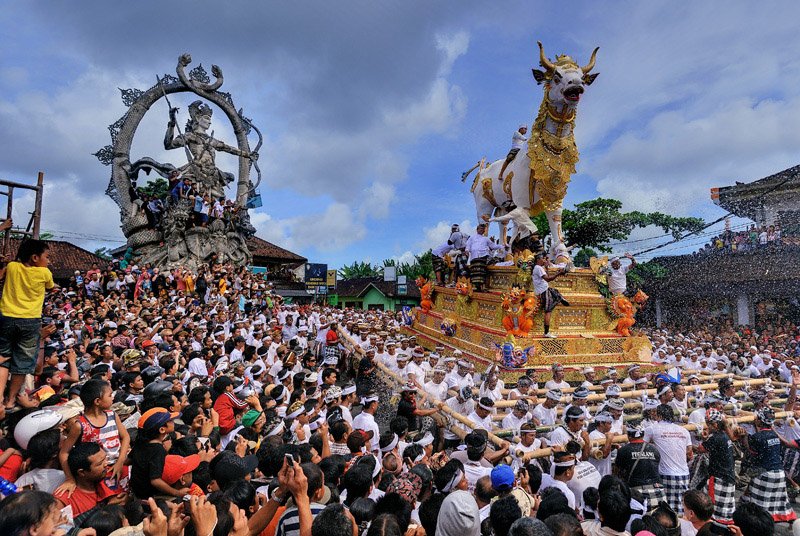Attending a Balinese cremation ceremony, known as Ngaben, offers a profound glimpse into the island’s rich spiritual and cultural tapestry. This sacred ritual, deeply rooted in Balinese Hinduism, is not merely a farewell but a celebration of life’s cyclical nature. For visitors, participating or observing the Ngaben is a privilege that requires sensitivity, respect, and understanding.
🕊️ Understanding Ngaben: A Sacred Rite
Ngaben, also referred to as Pitra Yadnya or Pelebon, is the Hindu cremation ceremony practiced in Bali. It marks the release of the soul from the physical body, allowing it to transcend the earthly realm and embark on its journey toward the afterlife. The ceremony is a communal event, often involving elaborate rituals, music, and processions. While the occasion is somber, it is also a celebration of the deceased’s transition to the spiritual world.
👘 Dress Code: Modesty and Respect
When attending a Ngaben, appropriate attire is crucial. Both men and women should wear modest clothing that covers the shoulders and knees. A traditional Balinese sarong (kamben) and sash (selendang) are recommended. These garments are available for rent or purchase at various shops across Bali. It’s advisable to avoid wearing bright colors; subdued tones like white, black, or earth colors are preferred.
🧘♀️ Etiquette During the Ceremony
1. Maintain Silence and Reverence
The Ngaben is a solemn event. Maintain a quiet demeanor, refraining from loud conversations or laughter. Keep your mobile phone on silent mode to avoid disturbances.
2. Seek Permission Before Photographing
While the ceremony is visually captivating, always ask for permission before taking photographs or videos. Some families may prefer to keep the proceedings private.
3. Position Yourself Appropriately
Avoid standing or sitting in front of the altar or the priest. Ensure that your head is not higher than that of the priest, as a sign of respect. Sit cross-legged or with legs to one side; avoid stretching them out towards the altar.
4. Refrain from Touching Sacred Objects
Temples and ceremonial objects are sacred. Do not touch statues, offerings, or other religious items without explicit permission.
🛑 Who Should Refrain from Attending
Certain individuals are advised against attending a Ngaben ceremony:
- Women during menstruation: Balinese customs prohibit menstruating women from entering temples or participating in certain rituals.
- Individuals with open wounds or recent surgeries: These individuals are considered ritually impure and should avoid attending.
- Those in mourning: If you’ve recently lost a close relative, it’s customary to refrain from attending such ceremonies until the mourning period has concluded.
🌺 Participating in the Ceremony
While direct participation is typically reserved for family members, visitors can respectfully observe and, in some cases, assist in non-ritualistic aspects. Offering flowers or incense as a sign of respect is appreciated. Always follow the lead of the locals and accept guidance from the ceremony organizers.
🌿 Environmental and Ethical Considerations
The traditional cremation process involves burning large structures, which can have environmental implications. Some communities in Bali are exploring sustainable practices, such as using fewer resources or adopting alternative methods of cremation, to mitigate these effects.
🧭 Tips for a Respectful Experience
- Do your research: Understand the significance of the ceremony and its components.
- Arrive early: This allows you to observe the preparations and settle in before the ceremony begins.
- Engage with locals: If invited, engage respectfully in conversations to learn more about the customs.
- Express gratitude: Thank the hosts for allowing you to witness such a personal and sacred event.
📝 Final Thoughts
Attending a Balinese Ngaben ceremony is a profound experience that offers insight into the island’s spiritual beliefs and cultural practices. By adhering to the guidelines and showing genuine respect, visitors can participate in this sacred tradition in a meaningful way.










Join The Discussion